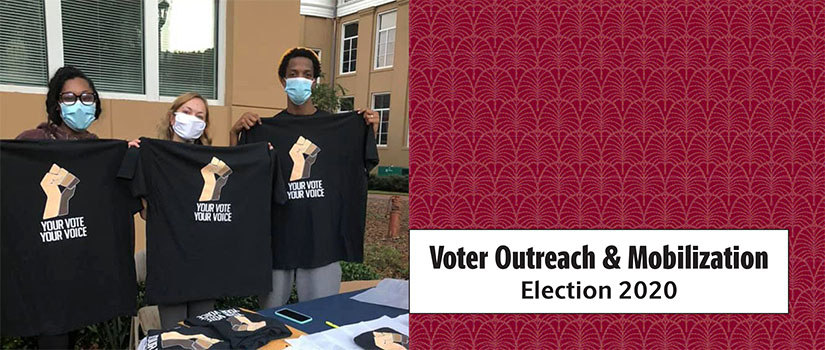Oct. 20, 2020
Chris Woodley • cwoodley@mailbox.sc.edu
According to a Pew Research Center study in 2018, four in ten Americans who were eligible did not vote in the 2016 presidential election. Nonvoters tend to be politically disengaged, but advanced year Master of Social Work students Josie DeShong and Olivia Cannon are committed to advocating the importance of and encouraging everyone to vote early or go to their polling location on Election Day November 3.
This past summer, Associate Dean for Diversity, Equity and Inclusion Kirk Foster emailed College of Social Work students and asked for ideas on how the college could promote diversity and inclusion. DeShong submitted some suggestions but most of them were restricted due to COVID-19. Foster suggested that some of her ideas could be directed towards a voter mobilization group.
“One of my ideas was to meet with local legislators in person and tell them about our concerns,” DeShong says. “I thought about Zoom meetings because of the pandemic, but that turned into what we as students can do and how to involve others. Dr. Foster was trying to direct interest to the upcoming election, and that's how we started our voter mobilization efforts.”
Olivia Cannon was one of the students to join and help co-lead the voter mobilization outreach. She followed the 2016 presidential election closely but did not participate in any voter outreach activities. Earlier this year, Cannon was frustrated because she was unable to march and show support for social justice causes since her boyfriend has diabetes, and she did not want to put him at risk to possibly contracting COVID-19.
“My boyfriend told me that there are other ways that I can show my support and advocacy. I took his advice and ran with it,” Cannon says. “I couldn’t set up a voter registration booth in Columbia and Greenville due to COVID-19. But after the initial frustration of being unable to participate physically, I discussed some ideas with Josie. We were both passionate about social justice and voting, and it blossomed into what is now the voter mobilization group.”
Cannon and DeShong believe their voter outreach efforts have helped students think more critically about important issues. In addition to gathering information for a voter outreach page on the College of Social Work website, the team also organized a virtual panel in September on the political history of voter suppression and race, which included professors from the University of South Carolina, Clark Atlanta University, and the executive director of the Columbia Urban League.
“I kept seeing notifications that someone had joined the panel, and we had between 65 to 70 people,” Cannon says. “When you are tenacious enough to spread the word about voting, and keep educating others about the history of what we are doing and where we can take it, people want to know and weigh in on that effort. It was a highlight for me to see how many people were contributing to such an enriched conversation about our history with voter suppression.”
DeShong and Cannon also designed and sold t-shirts displaying the phrase, “Your Vote, Your Voice.” Around 80 shirts were sold to College of Social Work students, faculty and staff.
“There was a lot of excitement for the t-shirts,” DeShong says. “People want to show their support and having the shirts is a good way to show what they believe and how their voice can be used in a strong way for advocacy.”
A phrase often heard around elections is, “Does my vote really matter?” DeShong and Cannon hope their efforts have helped students understand the importance of each vote.
“I think we are helping to eliminate the ‘my vote doesn't matter’ mentality. People should know that their vote is an action towards trying to enact change that they think will be beneficial,” DeShong says. “This is one way to have a say in what you believe in, and even if things turn out differently than someone hoped for, at least they showed up and attempted to make a difference.”
“I try to remind people who are discouraged to still vote because it will matter,” Cannon says. “But I don't have to say that as much this year, and I think that is partly due to our efforts. I also believe it started over the summer with the innate need for social justice. People were fired up, and we just wanted to take that energy and keep it going in a way that’s channeled into voting.”
In addition to advocating and engaging more students in the election process, DeShong and Cannon have also learned valuable lessons from their experiences that will continue to be applied beyond this year’s election.
“This has been a team effort, and it takes time to create the messages you want to spread and organize activities,” DeShong says. “It's taught me that there are others who care and are on the same page regarding important issues. As a future social worker, I can utilize some of the lessons and skills I’ve learned, such as understanding the practical aspects of organizing a group and engaging more people.”
“This experience has taken a new approach to creativity, being challenged in a positive way, and the reinforcement that this is a collaborative effort,” Cannon says. “It’s a good lesson in working with others and delegating and organizing a project you're so passionate about while remaining objective and realistic.”
Foster has credited DeShong and Cannon with taking the initiative to motivate students to vote by applying their social work skills.
“I’ve been impressed with how they have considered the various obstacles people face in casting a vote and ensuring students have access to the information they need to make informed choices in both local and national elections,” Foster says. “They came into this effort with a vision and developed a strategy to make it happen.”
